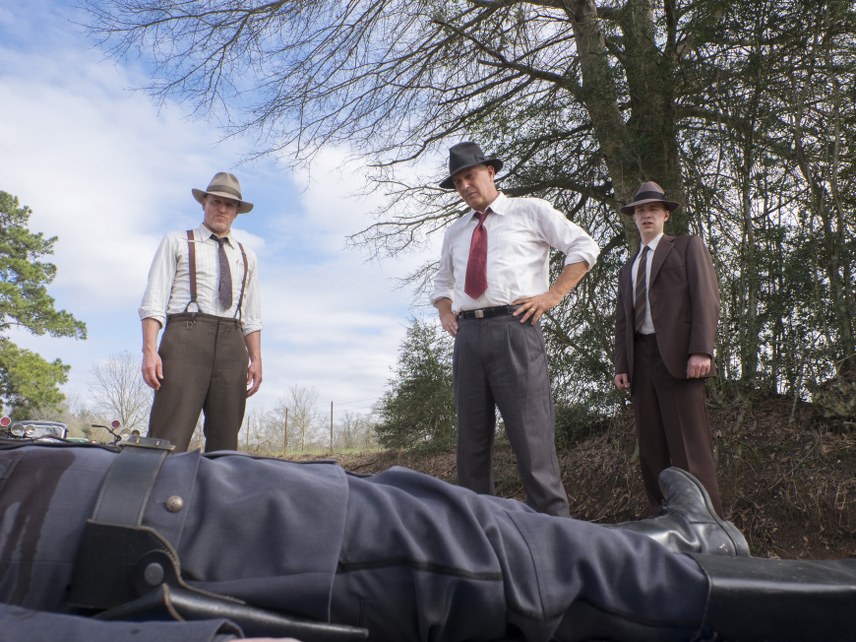The Highwaymen Tells the Bonnie and Clyde Story from the Deputies' Perspective
Kevin Costner and Woody Harrelson lead a brutal chase across Texas.

The Highwaymen. Available now on Netflix.
The story of Depression-era outlaws Bonnie and Clyde has been told many times, in just about every conceivable perspective, except one: that of the law enforcement officers who pursued them.
Knock that concept off the list with the arrival of Netflix's excellent The Highwaymen, starring Kevin Costner and Woody Harrelson as the two Texas deputies who outfoxed and outgunned their quarry.
Occasionally funny and often grim, The Highwaymen is sometimes reminiscent of another buddy movie involving a posse in pursuit of a famous outlaw duo, Butch Cassidy & The Sundance Kid, with its poles reversed.
That's no coincidence; The Highwaymen was originally written as a vehicle for Robert Redford and Paul Newman playing the aging lawmen Frank Hamer and Maney Gault. (Newman died in 2008, which gives you an idea of how long this show has been kicking around in development.)
Instead, Costner wound up as Hamer, a gimlet-eyed ex-Texas Ranger with more than 50 notches on his guns, while Harrelson plays his old partner, the wisecracking Gault. (Dust kicking up everywhere after he wildly empties his six-shooter at a target, Gault points to the single mark on the target and exclaims in wide-eyed wonder: "Look at that, every shot right through the same hole!")
But where Butch Cassidy was mostly light-hearted and treated its outlaw protagonists as pranksters rather than criminals, The Highwaymen takes a brutally Manichean view of its cops and robbers.
Bonnie and Clyde barely appear on screen, and when they do, they're portrayed not as populist Robin Hoods but as bank-robbing, cop-killing sociopaths. Hamer and Gault, if not exactly angels, are single-minded avengers, plucked from retirement by a Texas prison official bitter that one of his guards was killed in a jailbreak engineered by the outlaws.
They live in their car for months at a time, ignoring legal niceties like warrants and even jurisdiction as they give chase, always seemingly one town behind. There is never any question what will happen when the cops catch up. "It's never easy, it's never pretty," Hamer declares when Gault has a moment of doubt. "There's always blood at the end of the road. you know that."
At 57 and 64, their leading-man virility fading, Harrelson and Costner fit comfortably into the roles of the aging lawmen confronting a bewildering and hostile future. (Costner, who also plays the cancer-stricken patriarch of a ranching family on the Paramount Network's Yellowstone, seems particularly adapted to his new status.)
There's a sense of wry self-deprecation as they lose foot chases to young crooks and fumble their quick-draws. Yet there's also a palpable note of fear in Gault's voice as he asks, at the end of one long day: "Do you ever think maybe it ain't in us no more?"
The presence of stars, even if dimming, like Costner and Harrelson, is one of many instances in which The Highwaymen poses the question of how to distinguish a movie from a TV show in the age of streaming services. This is a question not merely of concern to film and TV critics squabbling over turf, but to industry big-chiefs like Steven Spielberg, too.
Netflix alone produced somewhere around 1,500 hours of original programming in 2018, and much of it was difficult to categorize. Its birth-of-rap drama The Get Down, divided into 11 episodes, may seem to be obviously a TV show; but no TV show in history ever had a budget of $12 million an episode.
I don't know what The Highwaymen cost to produce, but it has the sumptuous look and feel of a Hollywood blockbuster, from the presence of its stars to the lush, big-screen photography: shimmering rain, wispy smoke rings, the sere beauty of the summer prairie. And after its debut at South by Southwest, it got a few days in theaters to qualify it for Oscar nominations. The vast majority of The Highwaymen's viewers, though, will see it on their TV screens.
Figuring out The Highwaymen's show-business DNA is precisely the sort of question that would vex its heroes. In another faint whiff of Butch Cassidy, one of the subtexts of The Highwaymen is the encroachment of modernity on an era whose time has run out. Butch and Sundance, sensing the sunset of the Old West, fled to Bolivia. Hamer and Gault's odyssey winds through a countryside dotted with labor camps and repossessed land, the death throes of an America built on the family farm.
And they can scarcely conceal their loathing for the country's dawning tabloid culture. "You ought to be ashamed," Gault snarls at a cop taking money from a reporter in search of lurid details. In the background, you can almost hear the faint cackle of the Ghost of Kardashian Future.
